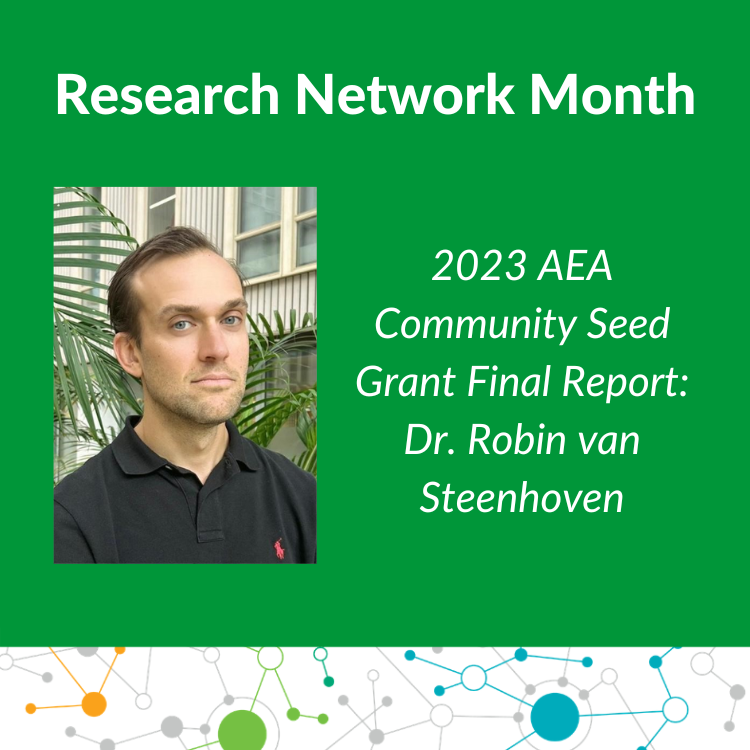2023 AEA Seed Grant Final Report: Dr. Robin van Steenhoven
November 29, 2024

It was August 15, 2023 when we introduced Dr. Robin van Steenhoven. Click here for the introductory post where we learned about him, his study plans and how his project would help patients and families affected by AE.
In the 2023 AEA Community Seed Grant Final Report, Dr. van Steenhoven explains the outcomes of his project, the Seronegative autoimmune encephalitis: exploration of clinical and neuropathological characteristics.
1. List the specific aims of your project and explain how they were met.
The overall aim of this project was to describe the clinical and neuropathological characteristics of seronegative autoimmune encephalitis (AE), according to the 2016 Graus criteria. The separate objectives are defined below:
- Description of demography, clinical characteristics (including CSF analysis and MRI findings), treatments and outcome in a cohort of seronegative AE from the Netherlands.
We have collected a cohort of 61 patients with seronegative AE that were comprehensively analyzed at the Erasmus University Medical Center. Currently, we are still analyzing the clinical data, focusing on early presentation, treatment regimens and clinical outcomes. - Characterization of key histopathological features in brain tissue of patients with seronegative AE obtained by biopsy or autopsy.
Brain tissue of 10 of 61 (16%) seronegative AE patients was obtained by brain biopsy or autopsy. In addition, we identified 9 patients in the Netherlands Brain Bank (NBB) and Dutch Surveillance2023 AEA Community Seed Grant Final Report Form July 2024 Centre for Prion Diseases (University Medical Center Utrecht) fulfilling the 2016 criteria for seronegative AE. - Identification of specific pathogenic mechanisms and clinicopathologic correlations in order to further subcategorize the spectrum of seronegative AE.
Currently, we are characterizing the neuropathological features of these 19 patients and will perform additional immunohistochemical stainings to precisely describe which part of the adaptive immune system is involved in seronegative AE. In addition, a subset of patients will be selected for additional molecular testing, by using spatial transcriptomics.
2. Describe the proposed impact/relevance of the project and the outcome.
- Our study will contribute to the awareness and early recognition of seronegative AE, by comprehensive description of the early symptoms.
- Subtyping within the group of seronegative AE based on clinical, histopathological and transcriptomic similarities will open the way to describe new subtypes of seropositive AE (identifying novel autoantibodies) and identify new, relevant pathways. This is essential for the development of targeted treatments and provides the opportunity to further expand the phenotype of AE in patients with unexplained clinical syndromes.
3. Explain how the results of your project have direct implications for patients with AE.
The clinical part of our study will improve the early identification and, consequently, rapid treatment of seronegative AE. The neuropathological part of our project will provide essential insights for the development of new treatments and optimization of already available treatments. Both aspects will ultimately result in improved long term outcomes of seronegative AE and relieve the burden of this group of diseases.
4. How did the AEA Community Seed Grant contribute to your ability to complete this project?
The AEA Community Seed Grant allowed me dedicated research time to work on this project and to collect this highly unique cohort and collection of brain tissue. In addition, I was able to obtain a larger grant to proceed with my research project into seronegative AE for the upcoming year and study brain tissue by using spatial transcriptomics.
Thank You, Thank You, Thank You!
Thank you, Dr. van Steenhoven for your research and your commitment to improving the lives of patients and families impacted by AE.
Thank you to the entire AE Alliance Community for contributing during the 2023 Research Network Month which assisted in funding this seed grant project.
Thank you for your contributions this year to fund future research!
Together, we are changing the course of AE.